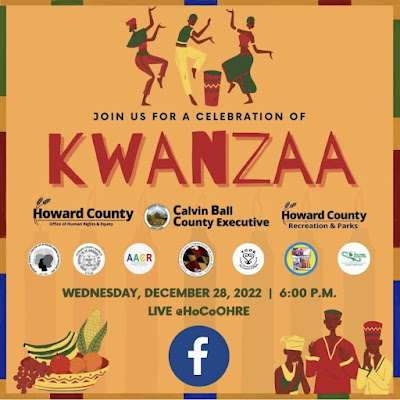This year’s community celebration of Kwanzaa in Howard County will be held at the Harriet Tubman Cultural Center. There’s something so satisfying about being able to write those words. Even though physical buildings don’t have life, the thought of those rooms and hallways being filled with celebration feels like an opportunity for new life for the beloved old school.
The event itself was booked up quite quickly, but you can watch online. In reading the information from the eventbrite page I found there was a lot there to learn from. For instance:
Habari Gani? ("What's the news?" in Swahili, the official Kwanzaa greeting)
True confession: the first time I heard the words “Habari Gani” was in a Barney music video when my daughter was little. Until this year I never realized they were asking a question and I am mortified that I never took the time to find out.
Through most of my years of teaching young children I followed the philosophy that it made sense to explore holidays if children in my class celebrated them. The reasoning was that children learn better if there is a personal connection involved, something that touches their real life experience. Every year I’d ask if any if my families celebrated Kwanzaa. I don’t think I ever had a yes.
Here’s where I dropped the ball. I never used my own initiative and in-born curiousity to dig in and learn for myself. I absolutely could have, and I didn’t. Perhaps I did have families who observed Kwanzaa but they didn’t want to be the ones who had to come in to school and teach everyone. They didn’t want to be the exotic “Kwanzaa” example for everyone to look at.
In retrospect I understand that doing it that way is placing a burden on Black families and it takes a toll. It’s tiring and it can be demeaning, even if schools and teachers think it is welcoming. Essentially it conveys this message:
We teach things that are important to everyone. If you want us to learn about your culture, you have to come in and do it.
So much everyday, ordinary racism is embedded in having the opportunity to learn about race, culture, life experiences, ideas, and history and just walking on by, thinking, “that’s not really relevant to me.”
Oof. Hindsight can be excruciating.
Have you heard people say, “It’s not enough to say you are not racist, you need to be actively anti-racist”?This is one of those occasions where the truth of that is driven home for me. It’s not that Kwanzaa itself is a make or break holiday that will define who is racist and who is not. It’s that we as white people have so many opportunities to center people other than ourselves and often we just…miss them.
If you don’t know much about Kwanzaa this page from the National Museum of African American History give you a good start.
One more thing. Look at the list of organizations who are partnering with the County Executive’s Office to put on this event.
- Howard County Office of Human Rights & Equity
- Howard County's Parks & Recreation
- Harriet Tubman Cultural Center
- Howard County Chapter of NAACP
- Howard County Center of African American Culture
- The Council of Elders (TCOE)
- The Links, Inc. Columbia (MD) Chapter
- African American Community Roundtable of Howard County
- Maryland Commission on Civil Rights
Celebrate African American culture and the seven principles of Kwanzaa. With inspirational presentations and musical performances we will explore creativity, self-determination, and faith of the Black community.
Today is day three of Kwanzaa. The theme is Ujima (Collective Work and Responsibility)
To build and maintain our community together and make our community’s problems our problems and to solve them together. (from the Kwanzaa: First Fruits page, National Museum of African American History)
Today is day three of Kwanzaa. The theme is Ujima (Collective Work and Responsibility)
To build and maintain our community together and make our community’s problems our problems and to solve them together. (from the Kwanzaa: First Fruits page, National Museum of African American History)


Comments
Post a Comment